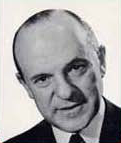| West | North | East | South |
| 1 |
1 |
2 |
|
| Pass | 3 |
Pass | 3 |
| Pass | 3 |
Pass | 4NT |
| Pass | 5 |
Pass | 5NT |
| Pass | 6 |
Pass | 7 |
| Pass | Pass | Pass |
The diagramed deal, from “Diamonds,” is classic Mollo.

With 60 on toward the first game in rubber bridge, Papa the Greek (North) happily opened one club. But slowly the auction began to run out of his control. So when the Hideous Hog (South) asked for kings with five no-trump, Papa lied, showing no kings — or so he thought. However, the Hog could not envision an opening bid opposite with one ace and no kings. Clearly, Papa had all four kings. But was seven spades or seven no-trump the better grand slam? The Hog produced the master bid: seven diamonds, asking his partner to choose.
Papa, though, loved seeing the Hog suffer, so he passed.
Immediately, the Hog berated Papa, his archenemy. But when the lead was a heart, the Hog put his mind to the play.

He won with his heart ten, played a club to dummy’s king, finessed the heart queen, cashed the heart ace (discarding one of dummy’s spades), led a club to dummy’s ace, played a spade to his queen and cashed the spade ace. That was seven tricks in. Then the Hog crossruffed the black suits to take the last six tricks.
Seven diamonds bid and made!
It is not often that a player makes a seven-level cue-bid. It is even rarer that his partner then passes. And it is rarest of all when not only does the grand slam make but is also the only one with any chance.
Yes, West should have led a trump, but that would have ruined a good story.



























